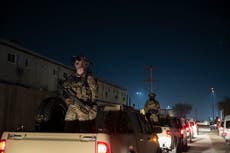The withdrawal of US troops leaves Afghanistan facing a bleak future
As with Cambodia and Vietnam in 1974 and 1975, America’s departure will encourage ruthless, ideologically driven insurgents fighting a weak government, writes Sean O’Grady


There is a neat symmetry to the end of American military involvement in Afghanistan on 11 September, 20 years to the day after the 9/11 attacks. That, though, is probably the only neat thing about this move, for the future of the country and the region remains messy indeed.
Endorsed by the UN and Nato at its inception, the war is now being ended, effectively though not formally, by the United States. The other coalition forces remaining – from Georgia, Germany and the UK among other nations – will no longer be viable without US air cover and other support. The action in Afghanistan remains, in fact, the only example of Nato’s Article 5 being invoked – that an attack on one is an attack on all. Unlike the “illegal” invasion of Iraq in 2003, there was never any question about the lawfulness, in principle, of the US-led intervention in Afghanistan. Indeed it was supported throughout the Islamic world. The UN Security Council resolution establishing the International Security Assistance Force (Isaf) was passed unanimously by its members – China, France, Russia, the UK, the US, Bangladesh, Colombia, Ireland, Jamaica, Mali, Mauritius, Norway, Singapore, Tunisia and Ukraine. Without America, however, there is no coalition and no Isaf.
The logic of President Biden’s thinking is, in its own terms, inarguable: “We cannot continue the cycle of extending or expanding our military presence in Afghanistan hoping to create the ideal conditions for our withdrawal, expecting a different result.”
That is true, but it leads to other questions, such as why America fought the war for as long as it did, who won, and what happens next, both for Afghanistan and for the west.
The answer to the first question is that three successive presidents – George W Bush, Barack Obama and, to a much lesser degree, Donald Trump – felt that it was winnable, was vitally important to America’s interests and victory in the “war on terror”, and that a new, more secure Afghanistan could be built.
Yet, like Vietnam before it, this long and pitiless conflict has drained American morale, losing the support of the public who could not see an end to the fighting, and exhausting her leaders. It was in fact President Trump who made peace, of sorts, with the Taliban, with a weak treaty envisaging the withdrawal of all US forces by May 2021, in return for assurances about the suppression of al-Qaeda and the formation of a power-sharing government with the existing adminstration in Kabul. To borrow a Trumpism, it was (arguably) the worst deal in history. Soon the Taliban, with no incentive to negotiate or behave, will be back in control of a considerable amount of territory, especially outside the capital, as indeed they already are. Al-Qaeda may have lost its leader, Osama bin Laden, in a mission by American special forces, but its members may well be back soon in their caves and makeshift training camps. Who is to say they won’t be plotting new attacks on America from their renewed base?
It is difficult to avoid the conclusion that America has lost its war in Afghanistan. As President Biden implied, and many predicted, it may not have been a winnable war in the first place, but America cannot claim peace with honour. As with Cambodia and Vietnam in 1974 and 1975, US forces leave behind a weak government trying to command often ill-disciplined or incompetent armed forces backed by corrupt police and civil institutions, no match for the ruthless, ideologically driven insurgents. The government of Afghanistan’s president, Ashraf Ghani, is trying to fight, as the Americans did, a conventional war against an unconventional, fast-moving guerilla force with strong roots in the countryside and well-practised techniques of wielding power through coercion and terror.
Afghanistan’s future looks bleak. As was the case during and after the Russian occupation, the country will be tribalised and fractured, with its neighbours, including Pakistan, Russia and India, trying to keep control over their proxies and their spheres of influence. Human rights and the limited freedoms of women will be “sent back to the Stone Age”, as one American general has predicted, and Afghanistan will be one of the most miserable and failed of the club of failed states.
Tony Blair, an ally of George W Bush, used to justify the British involvement in the bloody conflict in Helmand province and elsewhere by describing what he thought of as the alternative. After the Russians cut aid to their Afghan allies in 1991, they left behind a regime that lasted for a matter of weeks before the Taliban and their friends took over, and al-Qaeda was able to operate with impunity, even before 9/11. Neglecting Afghanistan in the 1990s, ignoring it in the hope that it was too far away and too poor to matter, and that it was too feeble to be a threat to anyone, was a grave error, and it may be one that the west is about to repeat, even if it has no choice.
Join our commenting forum
Join thought-provoking conversations, follow other Independent readers and see their replies
Comments
Bookmark popover
Removed from bookmarks